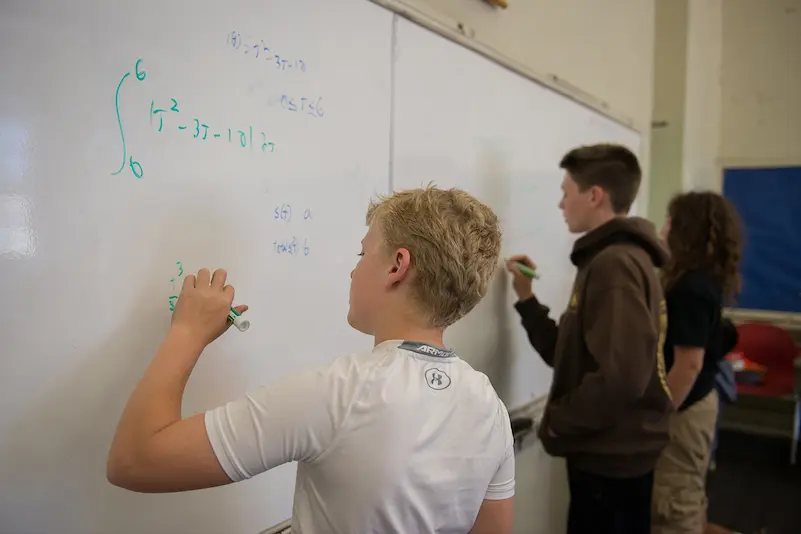Math Academy, A Decade Later

In a corner of the E building, an experiment is taking place. Its founding question: Can we teach kids math much much faster than we currently do? Ten years later, we’re seeing its lasting impact. Was it a success? A failure? It depends on who you ask. Some students say they thrive in the program, but for others, it left an acrid taste in their mouths.
This "experiment" is Math Academy, an accelerated math pathway in PUSD started by Jason and Sandy Roberts in 2013. In 6th grade, students who pass an entrance exam—about 5% of students—are placed into a highly accelerated math class, learning high school math concepts in middle school and college-level ones in high school. This translates to 8th graders taking the AP Calculus BC test, a test traditionally taken by seniors in high school. In high school, they learn topics such as multivariable calculus and linear algebra. Headlines in the Washington Post and the Chicago Maroon (the University of Chicago’s newspaper) marvel at the students’ mathematical abilities.
However, its reputation on campus is less than stellar. As one student put it, “Math Academy sucks and genuinely should not exist. The dropout rate is absolutely ridiculous and the stress it puts on students is just unparalleled,” said one student who left the program after 8th grade. “What stuck with me was when someone said that they enjoyed math despite Math Academy and not because of it.”
Another student stated, “They teach us like we are college students and not like the teenagers we are. It breaks people's passion for math and it’s bad for people's mental health.”
So what are the problems that students have with the program? For one, students say that going through content at such a fast pace results in very high standards and only a surface-level coverage of many important concepts. “We do too much in not enough time, and by the time we finish learning a topic, it doesn’t stick with us,” said another student who left after middle school.
There are even more issues at the high school level, one being the XP System. Students are assigned homework on the Math Academy website and are awarded XP (Experience Points) upon completion. Failing or lack of completion results in losing points. A student’s grade is based on how much XP they have accumulated. “The XP system is just dumb. It isn’t relevant to anything we learn in class and the negative XP discourages learning on the website because the goal isn’t to learn, it’s to get as much XP as possible,” said a sophomore currently in Math Academy.
Additionally, some high school students are frustrated that Math Academy classes do not transfer into college credit, meaning they have to take the same math classes again in college. One student said that “In middle school, Math Academy was a really, really good opportunity, but in high school, it’s not as good because you don’t get college credit.”
Seeing these alarming responses, we decided to talk to the teachers who head the program. Dr. Kyle Chapman, who teaches 9th, 11th, and 12th grade, says “the curriculum isn’t established at the high school level yet. Post-Calculus, things become very complicated, and it’s harder to form a pathway that’s coherent.”
Dr. Dylan Rupel, who teaches at Sierra Madre Middle School, said that “the level of math that we do in this class is very high. A lot of students ended up here by the will of their parents or for some external reason. The reality is that most people aren’t math people, and that’s okay. You can’t know if you’re a math person when you’re ten. I had a student whose passion lay in history, and they left. That doesn’t mean they aren’t smart.”
For the people who do have this “true passion for math,” the program has done wonders. We spoke to a former Math Academy student who left the PUSD and started college when she was 13. “It was such a unique environment for students that were very motivated about math without the pressure of a regular advanced math class… I think it’s pretty obvious by my choice of major [in applied mathematics] that I love math and being around STEM people so I do miss my peers and the environment sometimes.” In this year’s graduating class, former Math Academy students were accepted into Caltech and MIT.
The consensus? Math Academy means different things to different people. For some, it equates to a massive amount of stress and late nights, while for others, it’s a means to thrive. The program still has a long way to go to have a higher success rate among students, and it has the potential to be an effective and useful part of our school.

